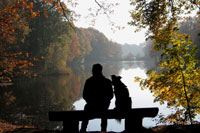Why Dogs Are Loyal

Although there is speculation that dogs in North America are somehow a mixed breed with wolves or a separate species from other canines around the world, complex DNA tests suggest otherwise.1 Results show that all domestic dogs come from a common gene pool, and it is suggested that geographically all dogs originated somewhere in eastern Asia.1
Dogs, as a species, can mate with other species such as wolves, coyotes, and jackals, and produce offspring. Certainly all share some physiological features, but the behavioral differences between wolves and dogs are actually profound, putting into question the theory that dogs are merely domesticated wolves. The cultural record of the deep relationship between dogs and humans also challenges the idea of a dog as simply a tamed wild animal or working farm stock.2
The earliest archeological evidence of the purposeful cohabitation of dogs and humans dates back about 12,000 years to canine bones found in Palestinian pet burial sites. Cultural evidence indicates that dogs and humans share a symbiotic bond, each helping enhance the survival of the other through companionship and hunting. The bond between humans and canines is so strong that dogs were even incorporated into the myths and religions of many cultures—from Greece to Egypt to the Aztecs of Mexico. In literature and other art forms of cultures all over the world, dogs have been and continue to be depicted as loyal and heroic companions.2
Why Are Dogs Loyal?
In general, the innate behavioral traits of dogs, especially in certain breeds, lend themselves to loyal human companionship:3
- Naturally and unconditionally affectionate
- Like to be close to people
- Develop attachments to people
- Similar biological clocks—active during the day, sleeping at night
Humans play a role in the development and nurturance of canine loyalty. As the nonverbal communication of affection is perceived as sincere by humans, they respond with like behavior to their dogs, reinforcing the loyal relationship between them.3
Did You Know?
Evidence of canine loyalty comes from some interesting places:
- Dogs have been used in the military, and even have their own memorial for loyal service. During WWI, Allied forces employed some 30,000 canines, and in the Second World War 12,000 dogs were used by the United States alone. The first war in Iraq saw about 1,600 military working dogs, and currently there are close to 2,000 canines participating in military operations.2
- Cave paintings dating back to the Bronze Age depict what appears to be a hunter surrounded by a pack of dogs as his hunting companions.2
- Many studies indicate that canine companionship offers real psychological benefits to distressed humans—including elderly nursing home residents, troubled teens, and foster children.3
- More recently, a blind employee in one of the World Trade Center towers on September 11, 2001 benefited from the extraordinary loyalty of his seeing-eye dog when the canine came back for him and slowly led him down the emergency stairwell shortly before the tower collapsed.5
- In Japan, a dog named Hachiko is still remembered for his unwavering loyalty to his human companion, a professor who took the train to work every day. Hachiko would go to the station and wait for the professor at the time of his return train in order to walk home with him. One day the professor suffered from a stroke and died at work. That didn’t stop his loyal friend—Hachiko returned at the appointed hour every day for 11 years hoping he would come home. Before Hachiko died in the 1930s, his loyalty was honored with a statue at the station, and his remains are on display at the National Science Museum of Tokyo.5
- An English setter named Sadie was out hunting with her owner in the hills of Kentucky one day when he suffered a heart attack. Sadie dragged the barely conscious man all the way home and stayed by his side while barking to alert his wife to the door, thereby saving his life.5
These stories are but a few of many demonstrating the extraordinary relationship humans and dogs have shared over the centuries.
Works Cited:
- Savolainen, Peter. Domestication of Dogs. [book auth.] Per Jensen. The behavioural biology of dogs. s.l. : Cabi Publishing, 2007. ISBN 1845931874, 9781845931872.
- McHugh, Susan. Dog. s.l. : Reaktion Books, 2004. ISBN 1861892039, 9781861892034.
- Serpell, James. The domestic dog: its evolution, behaviour, and interactions with people. s.l. : Cambridge University Press, 1995. ISBN 0521425379, 9780521425377.
- Coren, Stanley. The Modern Dog: How Dogs Have Changed People and Society and Improved Our Lives. s.l. : Simon and Schuster, 2009. ISBN 1439152888, 9781439152881.
- O'Meara, Ryan. News Hounds: The Wackiest Dog Stories from Around the World. s.l. : Globe Pequot, 2009. ISBN 1599214784, 9781599214788.
You May Also Like These Articles:
Dogs Make the Best Matchmakers
DOGTV: A Great Way to Help Dogs That Are Home Alone All Day
Disclaimer: This website is not intended to replace professional consultation, diagnosis, or treatment by a licensed veterinarian. If you require any veterinary related advice, contact your veterinarian promptly. Information at DogHealth.com is exclusively of a general reference nature. Do not disregard veterinary advice or delay treatment as a result of accessing information at this site. Just Answer is an external service not affiliated with DogHealth.com.
Notice: Ask-a-Vet is an affiliated service for those who wish to speak with a veterinary professional about their pet's specific condition. Initially, a bot will ask questions to determine the general nature of your concern. Then, you will be transferred to a human. There is a charge for the service if you choose to connect to a veterinarian. Ask-a-Vet is not manned by the staff or owners of DogHealth.com, and the advice given should not delay or replace a visit to your veterinarian.


